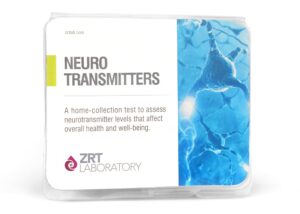Neurotransmitter Testing
In addition to hair testing (HTMA) we also offer the latest technology for neurotransmitter testing through ZRT Laboratory. Order the NeuroAdvanced Profile.
NeuroAdvanced Profile (Dried Urine) – Neurotransmitter Testing through ZRT Laboratory
86% of Americans have sub-optimal neurotransmitter levels!

ZRT Laboratory is the only lab to offer a 24-hour equivalent in four easy collections – resulting in a more accurate assessment of individual neurochemistry. Download neurotransmitter testing instructions.
- Download the handout “Neurotransmitters and Your Health”.
- Watch a video about neurotransmitters “Is The Neurotransmitter Test Right For You?”Presenter: Kate Placzek, PhD
In this educational webinar Dr. Placzek covers what neurotransmitters are, why we need them, what the neurotransmitter test tells you, reasons behind neurotransmitter imbalances and more.
About Neurotransmitters
Neurotransmitters are chemical messengers used by the nervous system to relay information from one nerve to another. Optimal neurotransmitter balance is required to maintain proper health. Imbalances can cause the brain and the body to be over- or under-stimulated, producing neurological or psychological symptoms.
In the neurological system, hormones are synergistic with neurotransmitters – modulating their production, signaling and metabolism. Because of this complex interplay, testing hormones and neurotransmitters together is an ideal way to generate a more precise clinical assessment.
This combined testing gives Practitioners a diagnostic edge over the traditional psychological inventory and offers the advantage of zeroing in on which therapies are best suited for individual patients – cutting down on the time-consuming process of trial-and-error for identifying treatment options.
Heavy metals are damaging to brain health. They disrupt neurotransmitter function and create oxidative stress that is detrimental to nerve cells, contributing to mood disorders, poor memory and dementia. Identifying exposure to heavy metals may be key to assessing and treating mood disorders and preventing neurodegenerative diseases.
In contrast, nutritional elements are generally protective for brain health. Lithium acts directly on the brain by slowing the progression of dementia and stabilizing mood, while elements like iodine and selenium act indirectly by supporting healthy thyroid and brain function.
NeuroAdvanced Profile (Dried Urine) Neurotransmitter Test analyzes common neurotransmitter-related causes of health issues often involve the following scenarios:
- Anxiety & Depression – Neurotransmitter imbalances are often associated with anxiety and depression, specifically Glutamate (panic attacks), PEA, Histamine, Serotonin, as well as Epinephrine & Norepinephrine.
- Chronic Fatigue – An imbalance between excitatory and inhibitory neurotransmitters can lead to persistent fatigue.
- Impulsivity – GABA, Dopamine and Serotonin are three chemical messengers commonly linked to disorders like ADD, ADHD & OCD.
- Insomnia Imbalances in Glutamate, Histamine, Dopamine, GABA and Serotonin are often linked to sleep disturbances and insomnia.
- PMS or PMDD – Imbalances in Serotonin, Dopamine, Norepinephrine and GABA are often involved in cases of PMDD (pre-menstrual dysphoric disorder) and severe PMS.
NEUROTRANSMITTER LAB SAMPLE – Download a ZRT Sample Neuroadvanced Report
NeuroAdvanced Profile includes the following 15 neurotransmitters which are easily obtained at home from a dried urine samples obtained using the test kit provided:
- GABA – gamma-aminobutyric acid
- Glu – glutamate
- Gly – glycine
- DA – dopamine
- Epi – epinephrine
- NE – norepinephrine
- HIST – histamine
- 5-HT – 5-HTP
- PEA – phenylethylamine
- DOPAC – 3,4-Dihydroxyphenylacetic acid
- HVA – homovanillic acid
- 5-HIAA – a serotonin metabolite.
- NMN – nicotinamide mononucleotide
- VMA – vanilmandelate
- Crtn – creatine transporter

